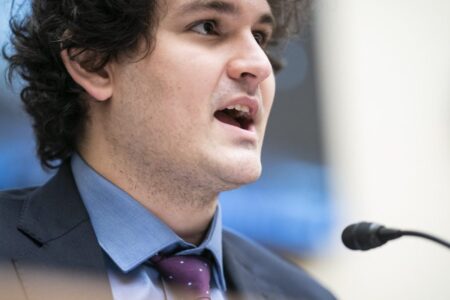Sam Bankman-Fried, the former CEO of the now-bankrupt crypto exchange FTX, likes to talk. He likes to talk to the media. He likes to talk on social media. And he likes to talk to attorneys, even while on trial for seven counts of fraud.
On Friday, in a widely anticipated appearance on the witness stand, the former crypto mogul finally gave his version of FTX’s sudden collapse—and it was a mouthful. In the weekend interlude before Bankman-Fried takes to the stand on Monday to finish his direct testimony, Fortune dug into the court transcripts to quantify how much “word salad” he produced.
The answer? Unsurprising, a lot more words per response than Caroline Ellison, Gary Wang, and Nishad Singh—the three key lieutenants who testified against Bankman-Fried before he took to the stand in one last Hail Mary to rescue his foundering defense.
Bankman-Fried—by the numbers
“The witness has what I’ll simply call an interesting way of responding to questions,” Judge Lewis Kaplan, who’s presiding over the trial, said of Bankman-Fried during a dry run of his testimony the day before the former crypto mogul appeared in front of the jury.
And when Bankman-Fried did appear in front of the jury on Friday, Kaplan’s patience often wore thin. He repeatedly exhorted the former FTX CEO to stop pitter-pattering around friendly questions from his very own lawyer. “Mr. Bankman-Fried, that’s a ‘yes’ or a ‘no,’” Kaplan said at one point to the defendant, noticeably exasperated.
Kaplan was right to be frustrated. Bankman-Fried’s answers during direct examination on Friday had 73% more words on average than the answers of his three lieutenants during their direct examinations, according to an analysis by Fortune.
In aggregate, Ellison, Wang, and Singh averaged about 16 words in response to questions from prosecutors. Bankman-Fried blurted out almost 28 to his lawyer, Mark Cohen, while on the stand. Singh, the former head of engineering at FTX, was the second-most verbose of the four, notching almost 20 words per answer, and Wang, the former CTO who has a reputation for being tight-lipped, was the least, at about 12 words.
The medians of each witnesses’ word count fell along similar lines, but interestingly, Ellison, the former CEO of the crypto hedge fund attached at the hip to FTX, slightly surpassed Bankman-Fried. She uttered 12 words per answer to his 11.
Going long
Medians help control for outliers, but in the case of who’s being the most longwinded, the outliers, or the longest responses, stand out.
Predictably, Bankman-Fried’s longest answer per word count was a small essay: a 424-word response to a simple question from Cohen, his lawyer: “Can you tell us about it?”
Cohen was asking the former FTX CEO to explain the crypto exchange’s “risk engine,” or the mechanism to stop the fallout from customers’ risky bets affecting others on the exchange. Bankman-Fried proceeded to talk about how a trillion-dollar mistake allegedly led to the introduction of a key piece of code that prosecutors argue was partly responsible for letting Alameda Research, the crypto hedge fund that Ellison fronted, withdraw billions in customer funds.
The closest response in length to Bankman-Fried’s was from Wang, which clocked in at much more modest 159 words. Singh was aware of his verbosity. “I’m sorry. This answer is long,” he said in response to a prosecutor’s question about Bankman-Fried’s involvement with Alameda.
And Ellison’s longest answer was her most emotional. Answering a question from prosecutor Danielle Sassoon about her mood swings in the week of FTX’s collapse, Ellison broke down: “I mean, yeah. To be clear, that was overall the worst week of my life. I had a lot of mood swings during that week and a lot of different feelings. But one of the feelings I had was an overwhelming feeling of relief because, as I said, this had been something that I had been dreading for so long…”
After continuing to describe the sense of relief she felt as FTX crumbled amid accelerating customer withdrawals, she concluded: “I obviously felt indescribably bad about all of the people that were harmed and the people that lost their money, the employees that lost their jobs, people that trusted us that we had betrayed.”
